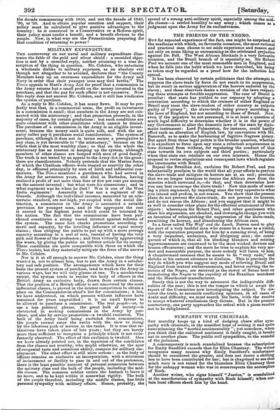THE FRIENDS OF THE NEGRO.
BUT for repeated experience of the fact, one might be surprised at the readiness with which, on favourite occasions, the most rational and practical men choose to set aside experience and reason and act only on some liking as unreasoning as the celebrated prejudice against Dr. Fell. The West African blockade is a very favourite occasion, and the Brazil branch of it especially so. Sir Robert Peel we account one of the most reasonable men in England, and when he falls into the habit which we have described, his being so taken may be regarded as a proof how far the infection has spread. It has been observed by certain politicians that the attempts to suppress the slave-trade by force do not result in its suppression, but do result in serious aggravation of the horrors endured by the slaves ; and those observers desire a revision of the laws respect- ing these attempts at forcible suppression. The case of Brazil is peculiar : that state has yielded to our urgency by adopting a convention according to which the cruisers of either England or Brazil may treat the slave-traders of either country as culprits guilty of " piracy "beingthe slave-trade being piracy according to the laws of England, but not according to lose of Brazil. Now, even if the negative be not presumed, it is at least a question of much legal difficulty to determine whether it is in the power of any Government to alter the domestic laws of the state by diplo- matic instrument: Lord Palmerston, for instance, could hardly effect such an alteration of English law, by convention with Mr. Bancroft, as to make the harbouring of fugitive Negroes piracy. But apart from those legal points is the broader question, whether it is expedient to force upon any state a reluctant acquiescence in laws dictated from without, for regulating the conduct of that state towards its own subjects and third parties ; particularly when that state can retaliate on our own interests. Hence the proposal to revise stipulations and consequent laws which regulate the intercourse with Brazil.
Repeal the Brazilian Act, exclaims Sir Robert Peel, and you substantially proclaim to the world that all your efforts to prevent the slave-trade and mitigate its horrors are at an end ; proclaim that we no longer interpose to rescue the African race from the miseries which surround it,—do that, and then determine how you can best encourage the slave-trade ! Now this mode of meet- ing a plain argument, by imputing aims the very opposite to what you intend and profess is not reason. You show that the present plans do not prevent the slave-trade, do not prevent its horrors, and do not rescue the African ; and you suggest that it might be as well to consider other plans for the effectual attainment of those objects : whereupon Sir Robert Peel, and other gentlemen who share his arguments, are shocked, and downright charge you with an intention of relinquishing the suppression of the slave-trade, permitting its horrors, and abandoning the African race. In a farce called The Wolf and the Lamb, Farren used to play the part of a very bashful man who comes to a house as a visite; with the reputation prepared for him by a cunning rival, of being a very impudent, audacious and designing man ; the conse- quence of which is, that all his blushing blunders and retiring ingenuousnesses are construed to be the most wicked devices and brazen effronteries ; and the more he tries to explain his very mo- dest and reasonable purpose, the more nobody will listen to him. A chambermaid assumes that he means to be "very rude," and shrieks at his earnest advances to disclaim. This is precisely the way in which you who suggest any mode of relieving Brazil and England from mutual embarrassments, and better serving the in- terests of the Negro, are received as the envoy of Satan bent on immolating the Negro to the cupidity of the Brazilian merchant and the Manchester manufacturer.
Surely this is not the way to surmount the indisputable diffi- culties of the case; this is not the temper in which to await the report of the Committee now investigating the subject. To dis- cover the truth, to reconcile conflicting opinions, in all cases of doubt and difficulty, we must search the facts, with the resolve to accept whatever conclusions they dictate. But in the present controversy, one party approaches the ordeal with a pious resolve not to be enlightened.


























 Previous page
Previous page